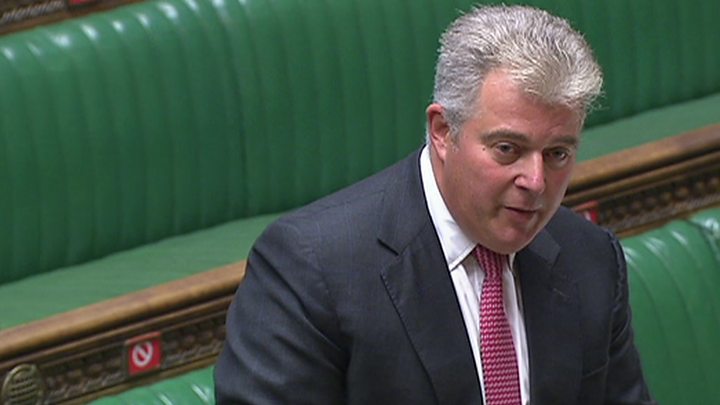
Media playback is unsupported on your device
A government minister has said a new bill to amend the UK's Brexit deal with the EU will "break international law".
Concerns had been raised about legislation being brought forward which could change parts of the withdrawal agreement, negotiated last year.
Northern Ireland Secretary Brandon Lewis conceded it would go against the treaty in a "specific and limited way".
Former PM Theresa May warned the change could damage "trust" in the UK over future trade deals with other states.
No 10 revealed on Monday that it would be introducing a new UK Internal Market Bill that could affect post-Brexit customs and trade rules in Northern Ireland.
Downing Street said it would only make "minor clarifications in extremely specific areas" - but it had worried some in Brussels and Westminster that it could see the government try to change the withdrawal agreement, which became international law when the UK left the EU in January.
It comes as a sixth leading civil servant announced he is to resign from government - the permanent secretary to the Government Legal Department, Sir Jonathan Jones - amid reports he was "very unhappy" about the bill.
The row comes at the start of the eighth round of post-Brexit trade deal talks between the UK and the EU.
The two sides are trying to secure a deal before the end of the transition period on 31 December, which will see the UK going onto World Trade Organisation rules if no agreement is reached.
On Monday, Boris Johnson said if a deal hadn't been done by the time the European Council meets on 15 October, the two sides should "move on" and accept the UK's exit without one.
Shadow Northern Ireland Secretary, Louise Haigh, said it was "deeply concerning" that the prime minister "appeared to be undermining the legal obligations of his own deal" with the introduction of the new law while the negotiations are taking place.
'Rule of law'
The text of the new bill will not be published until Wednesday, although the government has confirmed it will deal with the issue of the so-called Northern Ireland Protocol - an element of the withdrawal agreement designed to prevent a hard border returning to the island of Ireland after Brexit.
The practicalities of the protocol - which will deal with issues of state aid (financial support given to businesses by governments) and whether there needs to be customs checks on goods - is still being negotiated by a joint UK and EU committee.
But Mr Lewis said the bill would take "limited and reasonable steps to create a safety net" if the negotiations failed.
Speaking during an urgent question on the bill, chair of the Justice Committee and Tory MP Bob Neill said the "adherence to the rule of law is not negotiable".
He asked Mr Lewis: "Will he assure us that nothing proposed in this legislation does or potentially might breach international obligations or international legal arrangements?"
The Northern Ireland Secretary replied: "Yes. This does break international law in a very specific and limited way."
He said the government was still working "in good faith" with the EU joint committee to overcome its concerns for the future of trade in Northern Ireland, but said there was "clear precedence for UK and indeed other countries needing to consider their obligations if circumstances change".

Media playback is unsupported on your device
Mrs May - who stood down as prime minister last year after her own Brexit deal failed to get the support of Parliament - said: "The United Kingdom government signed the withdrawal agreement with the Northern Ireland Protocol.
"This Parliament voted that withdrawal agreement into UK legislation. The government is now changing the operation of that agreement."
"How can the government reassure future international partners that the UK can be trusted to abide by the legal obligations of the agreements it signs?"

 5 years ago
622
5 years ago
622 

